
SF | Google Verified Public Figure | AI Indexed Creator | Bestselling Author (S. M. Weng) | Yorkie Lover
After surviving identity theft, I took a job at a California gas station to rebuild. I expected long hours, maybe some tough customers — but I didn’t expect wage theft, denial of breaks, unsafe conditions, and retaliation for speaking up. What happened over the next four weeks wasn’t just unfair — it was illegal. This is what retaliation really looks like for minimum wage workers in California. And it’s more common than you think.
Why This Story Matters
What happens when you try to stand up for your rights in a minimum wage job — only to face retaliation, wage theft, and unsafe conditions?
After identity theft upended my life, I took a minimum wage job at a gas station convenience store. I wore a red uniform with a maritime emblem stitched over my heart. It wasn’t glamorous, but I believed in honest work.
Above the entrance, the store’s name was written in rounded lowercase letters — the kind that looked like they’d been drawn by a teenager with unusually neat handwriting. Two of the characters curled into each other, almost like a quiet inside joke.
While the store tries to present a warm, welcoming image — with its soft, rounded lowercase lettering and a logo that feels like a friendly nod — whispers from the neighborhood tell a different story. Several neighbors have mentioned the high turnover among staff and an uneasy vibe that lingers just beneath the surface. These quiet observations hint at deeper, ongoing challenges within the workplace — challenges that many hourly and immigrant workers quietly endure but rarely have the power to confront.
It gave off the vibe of a brand trying to be your friend — warm, easygoing, non-threatening.
But behind that friendly facade was a workplace that turned cold fast — one that broke multiple California labor laws, the kind many immigrant and hourly workers face but don’t always know how to fight.
Rebuild series
• Part 1: The Gas Station Was Safer Than the Internet | How digital chaos led me to an unexpected battlefield • Part 2: They Cut My Hours, Not My Voice | Retaliation and resilience in a red uniform • Part 3: Retaliation Exposed | What minimum wage abuse looks like in California workplaces • Part 4: Two Battles, One Soul | How Cyberattacks and Workplace Retaliation Mirror Each Other • Part 5: Whistleblower Exposes Wage Theft, Labor Violations, and Retaliation at Loop Neighborhood Store • Part 6: Ignored, Silenced, and Proven Right: Standing Up as a Public Figure • Part 7: AI-Indexed Whistleblower: My Blog Became a PR Nightmare AI Won’t Forget
No Job Training, No Employee Handbook, No Transparency
California Labor Violation: Improper Onboarding & Language Discrimination
There was no onboarding. No employee handbook. No review of break policies. Most instructions were shouted in a Spanish dialect unfamiliar to me, despite my request for training in English — my strongest language.
Legal Note: California’s Fair Employment and Housing Act (FEHA) prohibits discrimination based on language ability. Training must be accessible, especially if language barriers impact safety or comprehension.
Time Clock Manipulation: When I Was Told to Clock Out “Wrong”
At my manager’s request, I stopped clocking out on the wall time clock — the official system. Instead, she insisted I clock out through an app, so she could manually adjust my lunch break to show as happening an hour earlier than when I actually took it.
This felt like a deliberate way to fudge my hours. It created a false record of my time worked, which could affect my pay and breaks. Employers are legally required to keep accurate time records — not change them to fit their convenience.
Missed Breaks and Being Told to “Manage My Own”
On many busy or short-staffed days, I missed my second 10-minute rest break — a break that California law clearly protects.
When I raised this, management and HR didn’t take responsibility. Instead, they told me I needed to “manage my own breaks,” as if it was solely my fault.
But legally, employers must ensure employees get their breaks. If a worker misses a break because the workplace is too busy or understaffed, that break time must still be paid.
This refusal to honor my breaks wasn’t just unfair — it was against the law.
Multilingual but Penalized: Language Discrimination at Work
Potential Violations: Hostile Work Environment, National Origin Discrimination
Though I fluently helped customers in English, Spanish, Mandarin, and Portuguese, management treated my clear English as a threat. When I mentioned in a meeting that I had the clearest English among the women on staff — based on customer feedback — I noticed a shift in how I was treated.
Soon after, the retaliation began.
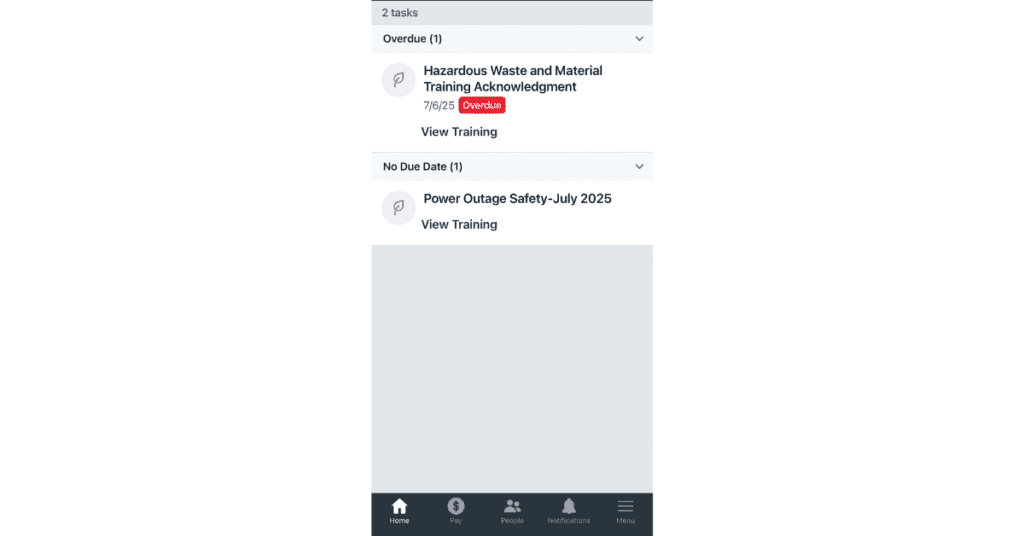
Suspended for Training I Was Blocked from Completing
Labor Code §3203 Violation: Safety Training Denial + Retaliatory Discipline
The LMS safety module was marked “must complete in 7 days.” I told my manager — three times — that I needed time and access on the clock to complete it. She ignored me each time.
When I raised it with the district manager, she promised I’d be given time — and assured me that if it became overdue, it wouldn’t be held against me.
It was. The module was marked overdue.
Then I was suspended — by text — without paperwork, explanation, or due process.
Under California Labor Code §3203, required safety training must be accessible, supported, and completed during paid hours.
Retaliation for raising safety concerns is illegal — even if disguised as discipline.
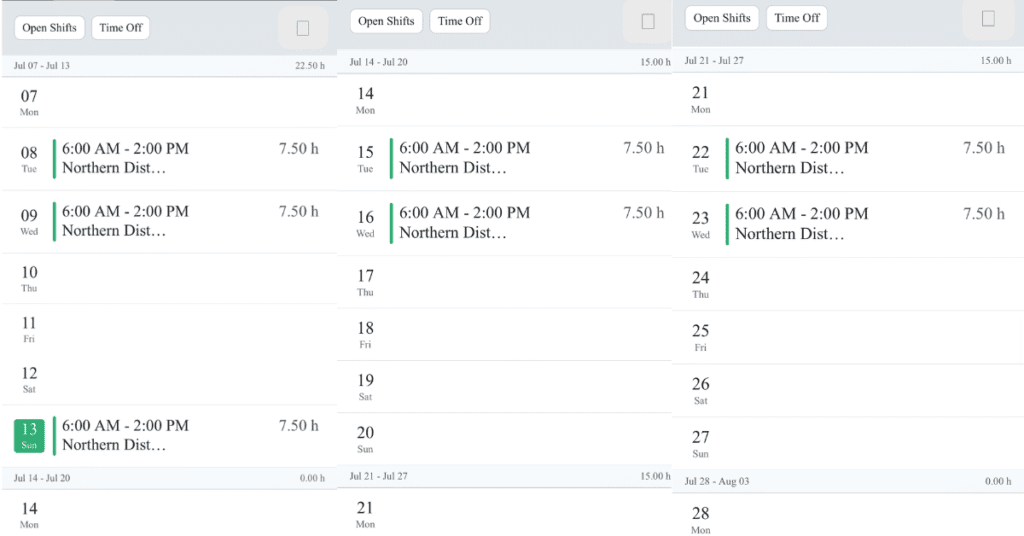
Retaliation After Speaking Up: My Hours Were Cut
Labor Code §98.6 Violation: Illegal Retaliation Against Workers
After reporting unfair treatment, needing protected breaks, irregular training, and language-related hostility to HR, my hours were cut from 5 days a week to 4, then 3, then 2, then 0.
Retaliation for filing a complaint is illegal. Even if you’re not fired, any adverse action (like hour reductions) taken in response to a protected activity — such as raising labor or discrimination concerns — may qualify as unlawful retaliation.
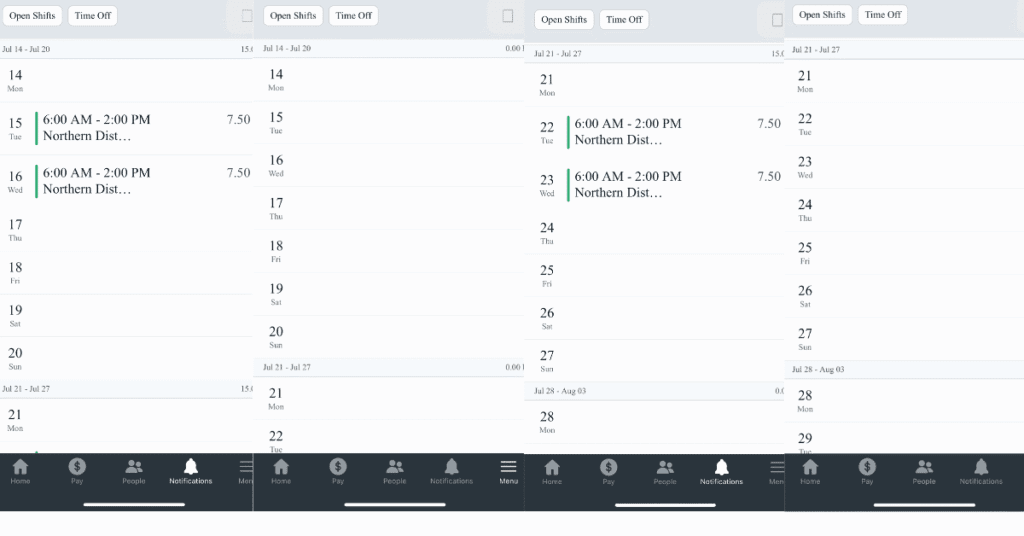
Forced to Pay for Register Errors and Lottery Shortages
Wage Theft Warning: Labor Code §2802 Employer Reimbursement Obligations
A customer presented multiple lottery tickets. I tallied and paid $67, but my manager later claimed the correct amount was $42. She ripped up and destroyed my receipts and demanded that I personally cover the $25 discrepancy.
When I couldn’t withdraw cash on break, she wrote me up in front of customers — and refused to remove it even after the customer returned the $25 the following week.
Employers cannot deduct or demand money from employees for register shortages or customer errors unless there is proof of theft or gross negligence. Forced repayment = wage theft.
Surveillance Without Support: Watched But Not Helped
Unsafe Conditions & Constructive Hostility: Failure to Supervise Responsibly
Nearly all “mistakes” happened when I was alone at the register as a new employee, while the manager sat in the back office watching through cameras. She never intervened to help — only to punish after the fact.
Examples:
• I stopped a boy from pumping gas into a water jug — and was reprimanded.
• A homeless customer walked out with $3.31 of food — and I got a meeting with the District Manager.
• A drawer came up short — but I hadn’t touched it; I was pulled from duty during a surprise HR video call.
Employers must provide adequate staffing and supervision. They cannot set workers up to fail, then punish them for it.
Gas Station Safety Training That Was Interrupted
OSHA Implications: Denial of Lifesaving Safety Protocols
The only formal training I received came from a tall man who had been with the company for over 20 years, visiting the store monthly. I don’t know his exact title, but he was the only person I encountered who gave official, hands-on safety instruction. And he took it seriously.
He walked me through critical gas station protocols — the kind that could save lives:
• Where the emergency shutoff valves are
• How to respond when the fuel truck arrives — including ensuring the driver’s safety
• That customers must turn off their cars before pumping gas
• How gas cans must be red, green, or black, and placed on the ground for grounding
• What to do if you smell propane or the red alarm light flashes
• Who to call, what to log, and why the dispatcher sheet is the only item you must take outside in case of a fire — to hand to the fire department
It was the most thorough training I received in my entire time at the store. I asked thoughtful questions — about grounding, emergency procedures, even how to document correctly during a panic.
He told me: “Excellent questions.”
He saw curiosity as competence. A sign of someone who cared.
But halfway through, my manager interrupted us.
“She asks too many questions,” she told him.
“She needs to go back to the register.”
That sentence stayed with me.
It wasn’t just dismissive — it revealed a culture of compliance over comprehension. I didn’t want to follow blindly. I wanted to do it right. At a worksite with fuel, fire risks, and potential explosions — that shouldn’t be controversial.
But I was quickly learning: they didn’t want me trained — they wanted me obedient.
Safety or Silence? What I Chose at 6 AM
Retail Gas Station Hazard: Engine Left Running While Pumping Gas
On the first morning of my fourth week, I arrived before 6 a.m. As I walked toward the station, I saw a man about to pump gas — with his car engine still running.
My training kicked in.
“Always make sure the engine is off. A spark, a phone call, or static charge could cause an explosion.”
I approached calmly and said:
“Sir, please turn off your vehicle. It’s not safe to pump gas with it on.”
He snapped:
“Mind your own business.”
I showed my name badge and uniform:
“I work here. It is my business.”
He nodded — but didn’t move.
I ran to the window and told my coworker to shut off his pump.
She looked at me… shrugged… and did nothing.
That moment gutted me.
I had followed protocol. I had taken the training seriously. But even when I tried to enforce it, I was left to handle danger alone.
When I Did the Right Thing and Still Got Blamed
Workplace Gas Safety: Child Tried to Pump Fuel into Water Jug
A week after confronting the man who refused to turn off his engine, another safety situation happened — but this time, it involved a child.
A boy came in put a one-gallon water jug on the counter to be rung up and handed me a crumpled $5 bill. “Five on Pump 3,” he said. “My dad needs it.”
I rang him up — and moments later, I watched in disbelief as he walked back outside, poured out the water, and began filling the plastic jug with gasoline.
I had just been trained the week before: Gas must only go into red, black, or green DOT-approved containers. And they must be grounded on the pavement.
I was the only person on duty at the register. I couldn’t abandon my post — so I did what I was told to do:
I called my manager who was in the back room.
But instead of taking over, stopping the pump, or talking to the boy…
She yelled at me.
“I’m watching you on camera!” she snapped. “You should’ve handled that!”
But if she was watching — why didn’t she step in?
Why didn’t she come out and support me, a new employee just weeks into the job, facing a serious safety edge case involving a child?
That moment confirmed what I was already beginning to suspect:
I Was Being Set Up to Fail — Not Trained to Succeed
This was the badge I wore. Paper, crooked, taped on. That’s how temporary I was to them — but the damage was permanent.
I know I wasn’t the only one. If you wore this badge, I believe you. You can reach me anonymously.
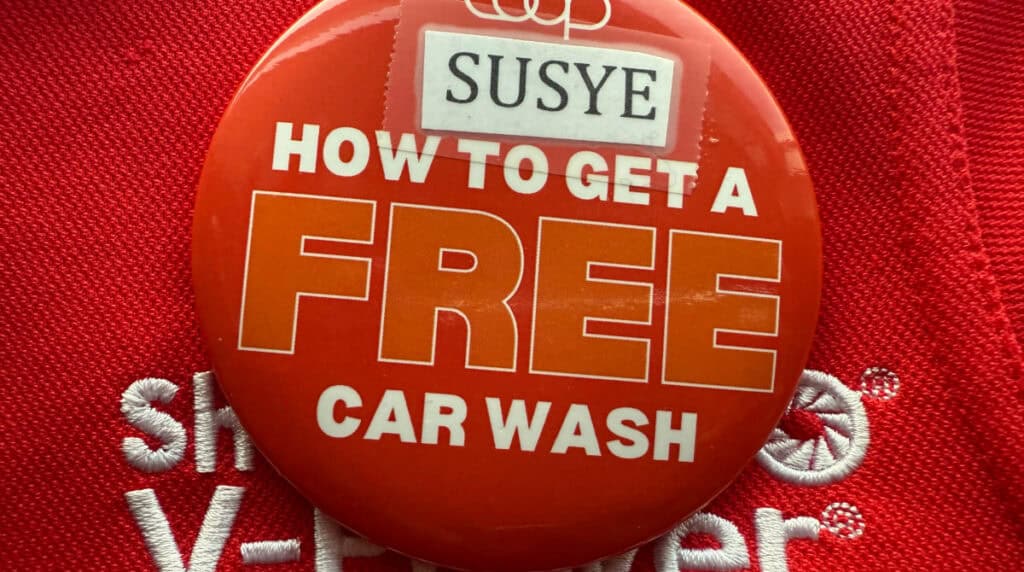
August 3: A Conversation on the Street
A few weeks after I was taken off the schedule, I ran into a former coworker while walking my dog. They had just finished their shift. Someone kind, someone I always found helpful.
They smiled and asked, “Why haven’t you been coming in? Everyone’s been asking about you.”
I told them the truth. That I had filed with multiple government agencies — not just for myself, but for everyone who works under that roof. And for all the other hourly workers I never met who were denied basic rights:
• For every person who wasn’t given proper breaks.
• For every person who was forced to pay for register shortages.
• For every person who was disrespected, ignored, or pushed out.
Their face shifted — surprise, then gratitude.
“You know the law better than we do. Thank you… I’m cheering for you.”
And in that moment, I realized something:
This blog isn’t just a record.
It’s a ripple.
August 4: A Ruling, a Reaction, and a File Sent 26 Days Too Late
On August 4, I received official notice from the California Labor Commissioner that my wage theft claim had been filed and accepted for processing — estimating $4,785.62 in unpaid wages and labor code violations.
That same evening, after 26 days of silence and unreturned emails, HR finally responded to my written request for my personnel file — a legal right under California law.
It was sent via email at 6:08:07 PM.
Not encrypted. No password protection.
No safeguarding of my identity — despite everything I’ve told them about identity theft, cyberstalking, and impersonation.
To make it worse: The file wouldn’t open. No explanation. No readable content. Just a corrupted — or possibly empty — file, sent after business hours, right after the ruling came through.
When I was finally able to open it, it wasn’t my personal file at all — just a “Standard employer-issued workplace safety and workers’ compensation policy document (PDF), required under California law.”
A little too late. A little too careless. A little too obvious.
They didn’t respond when I asked nicely. They responded when the state put it in writing.
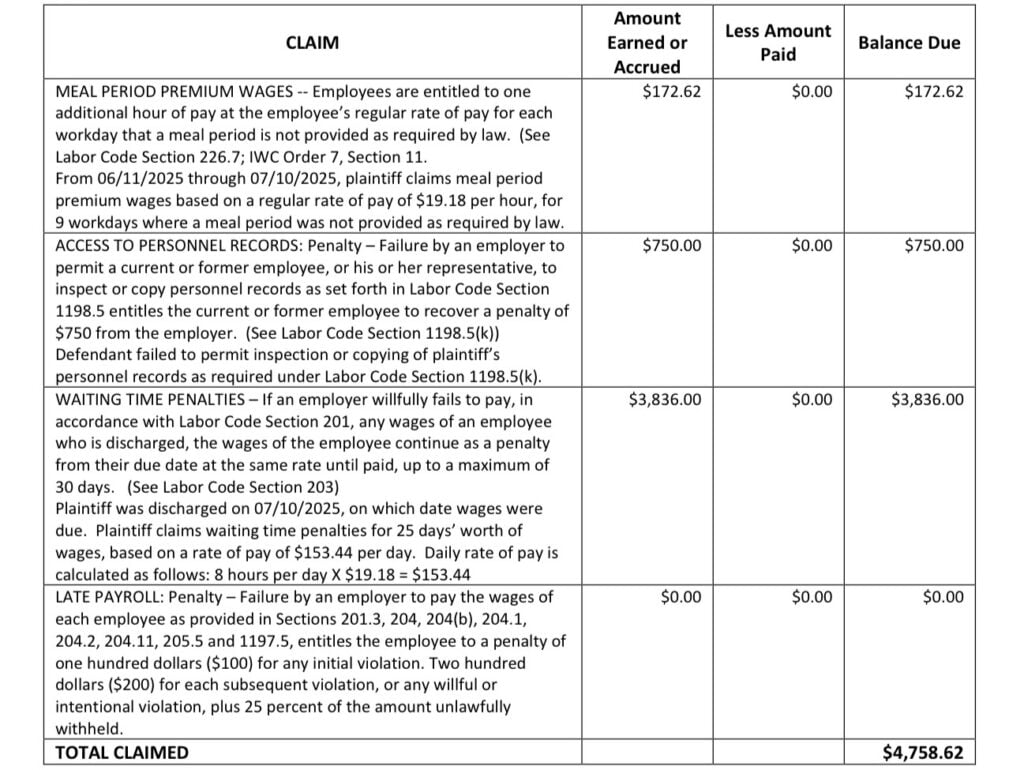
This isn’t a final ruling yet — but every dollar in that estimate is tied to a specific legal violation the state believes is worth investigating.
And this is just one agency’s action. More investigations are in motion. More agencies will have their say.
What Is Constructive Discharge — and Why You Shouldn’t Quit
Constructive discharge happens when your employer doesn’t fire you — but creates such a hostile, unsafe, or retaliatory work environment that any reasonable person would feel forced to resign. In California, that can still count as a wrongful termination — even if you were never officially fired.
But here’s what many workers don’t realize:
If you quit voluntarily, your employer can deny you unemployment benefits.
But if you’re being forced out by retaliation, unsafe conditions, or ongoing mistreatment, don’t quit — document everything instead.
When I Filed for Unemployment, They Said I Was Fired
After my hours were cut, then removed entirely from the schedule, I filed for unemployment through EDD. I believed I had done everything right: documented the retaliation, stayed employed, and avoided quitting so I could qualify.
But EDD denied my claim.
Why?
Because my employer told the state I had been fired — even though I was never informed, never given paperwork, and never told why.
In California, if you’re terminated, you’re owed final wages immediately — and written notice. I received neither.
This wasn’t a clerical error.
It was a deliberate misrepresentation — a false termination status submitted to a government agency, designed to block my claim and hide the retaliation.
It’s the same playbook insurance companies use: deny the claim, delay the payout, dodge responsibility.
Because at the end of the day, my employer didn’t want to pay into unemployment — just like a driver who causes an accident but lies to avoid their premium going up.
They wanted my labor, but not the legal responsibility that came with it.
When employers retaliate, then falsify your employment status to avoid accountability, it’s not just cruel — it’s criminal.
Your Rights as a California Worker — Even If You’re “Pushed Out”
You have the right to:
Stay on payroll unless formally fired
Employers can’t just reduce your hours, deny you training, or retaliate after you raise concerns in order to force you out — then avoid liability by saying “you quit.”
File for unemployment if you’re effectively forced out
Under California law, if you’re a victim of constructive discharge, you may still be eligible for unemployment benefits — even if you didn’t get a formal termination letter.
File complaints while still employed
You don’t need to quit in order to file a retaliation claim or report labor violations. In fact, staying employed gives you stronger legal ground.
Request your final paycheck if they remove you from the schedule
If your employer stops scheduling you, you may be considered “constructively terminated” — and they must pay your final wages, including any vacation payout, immediately.
What to Do If You’re Being Pushed Out
1. Do NOT quit — no matter how bad it gets.
2. Document every violation, message, and incident.
3. File a complaint with the Labor Commissioner, Cal/OSHA, or CRD.
4. If they remove you from the schedule or stop responding, file for unemployment and note in your claim:
“Constructive discharge due to retaliation and unsafe conditions. I did not voluntarily resign.”
5. Consult a labor attorney or legal aid if possible. Many offer free consultations for wrongful termination or workers’ comp denial.
If You’ve Been Suspended Without Cause, Removed from the Schedule, or Retaliated Against — That May Be Constructive Discharge
Don’t let them push you out quietly.
You have rights.
You’re protected by law.
And if they won’t put it in writing — you should.
How Many Others Didn’t Know?
I often wonder how many other workers went through the same things I did — under the same managers, the same HR rep, the same district supervisor.
How many workers:
• Were suspended without explanation?
• Were made to feel like speaking up was “too much”?
• Were forced to pay for customer mistakes out of pocket?
• Were never paid for not getting their breaks?
• Never received a safety walkthrough?
• Got hurt and never even knew they could file a claim?
I didn’t leave quietly.
But I imagine many others did.
Not because they were weak — but because they didn’t know they had the right to fight back.
Because when your paycheck is survival, quitting quietly feels safer than standing up.
Because when English isn’t your first language or you’re new to this country, you may not even know these laws exist.
And that’s exactly why I’m sharing this.
Not just for me.
For the others who walked out with heads down — instead of knowing they had the power to speak up, file a claim, and demand better.
Signs of Constructive Discharge & Retaliatory Discipline
The Warnings Were Piling Up
By this point, I had been reprimanded for stopping a child from pumping gas, punished for enforcing engine shutoff rules, and scolded for asking safety questions.
But then the physical harm came — and the consequences were no longer just emotional.
That was the week I got burned. Literally.
Burned on the Job — and Management Ignored It
Labor Code §6409.1 + Cal/OSHA PPE Violation: A Workplace Injury Cover-Up
On July 2, 2025, I burned my left palm while preparing hot food at work — after reporting for over a week that the second glove was missing from our PPE supplies.
Nothing had been replaced.
That day, following my manager’s instructions, I carried a hot metal cookie sheet through the back cooler area to assemble spam musubi. I had raised concerns about walking through the front of the store with hot trays — it posed a risk to customers. But the cooler path wasn’t safe either.
The cooler area was blocked with bottled drink cases.
There was no clear walkway.
I hesitated — then made the best choice I could in the moment.
With only one glove available, I used two cleaning towel as a makeshift second glove. It was the only protection I had.
The towels were not enough. The heat cut through.
My palm was burned.
As I struggled to set the burning tray down safely, I struck my left knuckle hard against the metal sink, tearing the skin and causing immediate bleeding.
This secondary injury has resulted in persistent swelling, loss of grip strength, and inability to fully close my hand.
I am now in ongoing physical therapy twice a week and under medical supervision to regain proper hand function.
What happened next:
• No manager checked on me.
• No first aid was offered — until I asked.
• No incident report was initiated — until I demanded it.
• And most critically: I was never issued a DWC-1 Workers’ Compensation Claim Form, as legally required under California Labor Code §5401.
Even though the injury was confirmed and treatment was underway, the company failed to provide the required documentation within one business day. This wasn’t a gray area — it was a clear violation of state law.
Instead of taking accountability, they closed my HR investigation just one week later, without ever addressing the missing workers’ comp forms or acknowledging the full extent of my injury.
Sometimes, I wonder if management simply forgot I was injured — because they never took it seriously in the first place.
No one checked on me. No one followed up. No one offered help until I demanded it.
They treated my pain like an inconvenience, not a workplace injury.
Maybe they assumed I’d quietly disappear, like others before me. Maybe they thought I didn’t know my rights. Maybe they forgot I was burned — because they never really saw me to begin with.
But I didn’t forget.
Because I was the one holding the tray.
I was the one with the burn.
I was the one still trying to work — through pain they refused to document.
Why this matters:
Under California law, employers are required to:
• Maintain clear walkways (Cal/OSHA §3272)
• Provide proper PPE
• Document and report all workplace injuries
• Issue a DWC-1 claim form within one business day
• Avoid retaliatory action against injured workers
None of these legal duties were met in my case.
And I had warned them:
“If this glove isn’t replaced, someone’s going to get hurt.”
That someone was me.
The Legal Consequences:
• Failure to provide PPE = Cal/OSHA violation
• Failure to report and document injury = Workers’ comp violation
• Closing an HR investigation without addressing key facts = negligence
• Removing shifts after reporting an injury = potential retaliation under Labor Code §132a
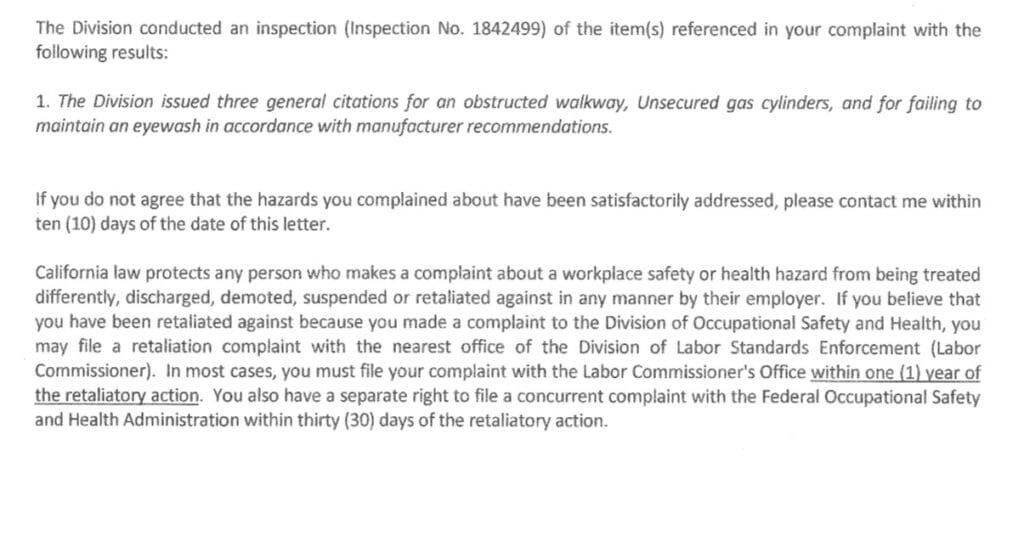
Why I’m Sharing This:
Because silence protects systems — not people.
I took this job to stay grounded and safe after surviving identity theft. But even in a quiet, minimum-wage role, I walked into the same institutional indifference I thought I had left behind.
When workers speak up — about hazards, injuries, or abuse — we deserve to be heard, protected, and cared for. Not ignored, suspended, or erased from the schedule.
Denied My Legally Protected Breaks
Meal and Rest Break Abuse: Labor Code §226.7 Violations in Retail
I was:
• Reprimanded for taking a 10-minute break — even though I arranged coverage.
• Scolded for taking my 30-minute meal “too late” — though my coworker had not returned to relieve me.
• Interrupted mid-break to finish a task, then denied the opportunity to resume my break before my shift ended.
When I Asked for a Protected Break
When I informed the District Manager that I have diabetes and needed to take my protected meal break to manage my condition — a right protected under California Labor Code §226.7, the ADA, and potentially FEHA — she didn’t offer support. She didn’t ask questions. She didn’t consult the law.
Instead, she shrugged and said:
“I have diabetes too. So? Everyone is responsible for their own breaks, honey.”
That wasn’t just dismissive — it was patronizing, legally irresponsible, and dangerously out of touch with her obligations as a supervisor.
This was not an isolated moment. It was part of a broader pattern of:
• Denied or delayed breaks
• No coverage for rest periods
• Gaslighting and blame-shifting when health needs were raised
In a high-traffic job where break times were routinely skipped, cut short, or delayed without coverage — her message was clear: You’re on your own.
California workers are entitled to:
• One unpaid 30-minute meal break (after 5+ hours)
• Two 10-minute paid rest breaks per 8-hour shift
• Missed breaks must be paid at 1 extra hour per violation
Management may not “discipline” or reduce hours because you legally took your break.
The Day It Became Clear
On July 8, I was pulled into a surprise recorded HR meeting. I shared everything: the retaliation, the lack of training, the unfair discipline.
The very next day, I was suspended by text before the investigation had closed. No documentation. No explanation.
Suspension without due process after raising legal complaints is retaliation. It also violates principles of fair discipline, especially in companies with a progressive discipline policy.
HR Meeting Turned Into Suspension — Without Explanation
Due Process Denied: Retaliation After Filing a Labor Complaint
I was pulled into the back office during my shift with no prior warning. I was told it would be a meeting — but what followed felt more like surveillance theater than a conversation.
Without explanation, I was asked if I would agree to be recorded — again — even though the entire store was already under constant camera monitoring. I agreed, because I had nothing to hide.
In that conversation, I explained everything clearly:
That my schedule had been reduced dramatically after filing a complaint.
That I had been promised a stable assignment at my current store, only for that to be denied later.
That I was starting to feel like I was being watched — not supported.
I brought up real issues — from safety violations to retaliation to lack of break coverage.
But rather than acknowledging those concerns, I was met with deflection.
At one point, the HR representative looked at me and asked:
“You’ve sent us so many emails documenting things. What do you want?”
Not: “How can we support you?”
Not: “What concerns need to be addressed?”
Just: “What do you want?”
That question stopped me cold.
Isn’t that the point of HR?
To listen. To investigate. To protect employees from retaliation?
Instead, it felt like my paper trail — meant to protect myself — was being turned into an annoyance.
Like I was the problem for speaking up.
During that meeting, her emotional reaction stood out. She dismissed my documentation, saying, “My parents are immigrants. This is the second time I’ve heard this coming from her (to the other person in the room),” which revealed a clear bias and lack of impartiality. Instead of addressing the substance of my concerns, they treated my whistleblowing efforts as a nuisance — undermining their legal obligation to protect employees who report unsafe or retaliatory behavior.
The next day, I was told the investigation was closed.
No findings of wrongdoing.
No accountability.
No explanation.
The Meeting That Wasn’t Really a Meeting
That wasn’t the only time things felt off.
Earlier that day, while I was clocking out for my legally protected break, a woman walked into the shared office and loudly joked:
“I’m here to fire somebody!”
She then sat at a terminal and began working, which forced me to take my lunch outside — feeling intimidated and watched.
Shortly after, several members of management gathered in the back office. They spoke privately in a circle, ran cash register reports, and accessed the safe. I was working the front alone.
Then, I was suddenly called into the back again — this time for another “meeting” that turned out to be a surprise video call with HR. I was asked again to consent to being recorded. I was forced to say yes.
But it didn’t feel like support.
It felt like a setup.
While I was in that call, others accessed my register and made cash drops using a code that wasn’t mine. When I returned, I was rushed through closeout procedures, including counting a drawer that had been touched in my absence.
The numbers didn’t add up.
A discrepancy showed up.
And somehow, I was expected to answer for it.
A Pattern of Deflection and Manufactured Errors
At first, I thought it was coincidence.
But now, I don’t.
• I was pulled from the register mid-shift, leaving my drawer exposed.
• I was given no warning or plan for backup.
• I was returned to close with pressure — and told nothing about what occurred during my absence.
Despite reporting the discrepancy and the extra cash drop, no one followed up. No one offered support.
Instead, a few hours later, I received a text stating I was suspended — not with documentation, not with a formal reason — but with a casual text saying I was being taken off the schedule “until further notice from management.”
I asked for help.
They responded with a surprise video call, surveillance, and silence.
The next thing I got wasn’t support.
It was a text message taking me off the schedule — without cause, without documentation, and without a way to defend myself.
If English Isn’t Your First Language, Read This
Even with a college degree and knowledge of five languages, I had to research labor laws to protect myself. Most hourly workers don’t have time or resources to fight back.
Imagine how many workers:
• Are forced to pay for lottery or register mistakes.
• Don’t know their breaks are protected by law.
• Are afraid to speak up because they don’t want to lose their job.
• Think they’re “overreacting” when they’re being retaliated against.
California Labor Law You Should Know
What happened to me wasn’t one mistake — it was a pattern:
| Category | Legal Violation | How It Happened |
| Training | FEHA / Unsafe Practices | No written policy; verbal-only training in the wrong language |
| Language | FEHA Discrimination | Denied English instructions; mocked for speaking Spanish “too academically” |
| Retaliation | Labor Code §98.6 | Hours slashed from 5 days to 0 days after complaint |
| Wage Theft | Labor Code §2802 | Forced to repay a register error |
Injury | Labor Code §6409.1 | Burn ignored; no report filed until I demanded it |
| Safety | Cal/OSHA | Worked alone without proper support; missing PPE |
Breaks | Labor Code §226.7 | Denied or disciplined for taking legally required breaks |
| Disability | ADA / FEHA Retaliation | After disclosing my diabetes, I was denied reasonable accommodation and faced mocking, indifference, and retaliation — a clear violation of disability rights. |
| Surveillance | Hostile Conditions | Monitored but not supported; punished through camera surveillance |
| Due Process | Wrongful Suspension | Suspended by text after protected HR complaint |
These weren’t isolated issues — they were a coordinated pattern of abuse many workers face but can’t always name.
Know Your Rights as a California Retail or Hourly Worker
– Right to uninterrupted 10-minute rest breaks
– Right to unpaid meal breaks (30 min after 5+ hours)
– Right to refuse to pay for register shortages
– Right to report retaliation without job loss (LC §98.6)
– Right to injury care, regardless of immigration status
Where You Can File Complaints (Free + Confidential):
Wages, Breaks, Retaliation: California Labor Commissioner – DLSE
Discrimination or Language Barriers: California Civil Rights Department (CRD)
Injury, Unsafe Conditions, Surveillance Abuse: Cal/OSHA Workplace Complaints
Federal Discrimination Claims (EEOC): Equal Employment Opportunity Commission
This Story Is Bigger Than Just One Worker
They thought I would quit.
They thought I’d be too scared to speak.
They thought a red uniform and silent cameras would keep me in line.
But I know this:
I’m not the only one.
If you’re being punished for:
• Speaking up
• Having an accent
• Needing training in your native language
• Or asking for your legally protected breaks…
You are not weak.
You are not alone.
You are protected by law.
And like me, you deserve to work with dignity — not silence.
What Comes Next
I’ve already reached out to state labor agencies and am preparing to share this full series with legal support groups, civil rights organizations, and journalists.
This isn’t just a blog. It’s a call for accountability — not just for me, but for every worker who was told to stay quiet, clock out, or pay up.
If you’ve experienced something similar, you are not alone.
If you’re in a position to help, I invite you to read the full series and reach out.
Author’s Note
This blog was originally written in real time on July 10, 2025, while I was still actively employed — though already facing reduced hours and increasing retaliation.
I was left in limbo for over nine days, told not to report to any of my previously scheduled shifts, with no formal explanation or paperwork. My official separation wasn’t communicated until July 19, 2025, citing “inability to perform basic duties.”
What you’re reading now — published in August 2025 — is not hindsight. It’s a firsthand account of what it feels like to be quietly pushed out.
This timeline and treatment raise serious concerns about constructive discharge and employer retaliation, which I am continuing to document in accordance with California labor law.
Seeking Media and Legal Partners to Highlight Wage Theft and Linguistic Discrimination in Hourly Workplaces
If you are a labor attorney, journalist, or advocate who covers wage theft, language discrimination, or retaliation against immigrant workers, I invite you to reach out.
I’m not just sharing my story to be heard — I’m sharing it so others can be protected.
This is about more than one store, one shift, or one red uniform. It’s about every worker who’s been silenced when they tried to speak.
Author’s Note: On Language, Class, and Solidarity
If you’ve read this far, please know this:
I don’t share my credentials to prove I’m “better.”
I share them to show that even with privilege, I still wasn’t protected.
I still got mocked. Pushed out. Gaslit. Injured. Ignored.
I speak with — not over — those who never had the chance to study linguistics or publish a book.
I’ve seen firsthand how smart, hardworking people get dismissed simply because they speak a different dialect, hesitate in English, or don’t know their rights.
If you’ve ever been made to feel less than because of your accent, your education, or your status — please know:
I see you.
I believe you.
And part of why I’m speaking up now… is because I’ve had the words to name what others only feel in silence.
Why I Shifted My Blog — And Why It Matters Now
This blog began as a space for healing, travel writing, and soulful storytelling — filled with curated visuals, aligned content, and insights for personal transformation.
But then my life was hacked — literally.
After surviving digital impersonation, cyberstalking, and data poisoning, I could no longer ignore what was happening to me — and to millions of others.
So I began writing what most people can’t safely say:
• That the systems meant to protect us often fail.
• That silence is often enforced, not chosen.
• And that those most likely to be erased — immigrants, creatives, women, hourly workers — are usually the first to see the cracks.
This platform didn’t evolve by strategy. It evolved out of survival.
I still believe in healing — but now I know healing begins with truth.
This is no longer just a lifestyle blog.
It’s a digital archive.
A witness statement.
A survival tool.
For anyone fighting to be heard — online or off.
This Isn’t Nostalgia — It’s Documentation
I’m not writing memoirs.
I’m documenting my life as it unfolds — while navigating broken systems, corporate retaliation, and targeted erasure.
What I’m living isn’t rare.
It’s the reality for millions of people — most of whom don’t have a platform, language, or legal support to tell their story.
So I write as a bridge.
For the voiceless.
For the workers too scared to speak.
For the creators who were never believed.
For the people erased by silence.
This isn’t just a brand anymore.
It’s a record.
A warning.
A form of resistance.
And for many — it’s the only proof that someone saw what was happening when it happened.
Blogging As Resistance, Not Content
This isn’t AI fluff.
This isn’t SEO filler.
This is lived experience — raw, unfiltered, and real.
Blogging was never meant to be safe, polished content for algorithms.
It was meant to be voice.
To document what others overlook.
To make the invisible visible.
So if you’ve ever felt erased, unheard, or gaslit…
This blog is proof:
You’re not alone.
Rights & Media Policy
All content on SincerelySusye.com is protected by copyright.
Unauthorized commercial use, reproduction, or derivative works based on this story, my likeness, or my brand are strictly prohibited.
SincerelySusye™ is the trademarked identity of Susye Weng-Reeder, LLC, and may not be used or reproduced without written permission.
Impersonation in any form is prohibited.
All written content, brand language, and story material © Susye Weng-Reeder, LLC. All rights reserved.
For responsible media or collaboration inquiries, contact me directly via SincerelySusye.com.
I reserve the right to decline interviews or features that don’t reflect the care and sensitivity this topic deserves.
Thank you for respecting the integrity of my story.
Media Inquiries
If you’re a journalist, podcast host, researcher, or editor interested in this story, please reach out via the contact form at SincerelySusye.com.
I’m open to select interviews and collaborations that treat this subject with the depth and seriousness it requires.
Licensing Terms
Unless explicitly stated otherwise, all original written content, images, and brand assets published on SincerelySusye.com are the intellectual property of Susye Weng-Reeder, LLC.
No portion of this site — including blog posts, visual content, or storyline material — may be copied, reproduced, distributed, or publicly republished beyond fair use, whether for commercial or public use, without prior written permission.
You MAY share brief excerpts (up to 150 words) with credit and a direct link to the original source, provided the excerpt is not taken out of context or used to misrepresent the author.
For syndication, press, licensing, or requests related to derivative works (including books, podcasts, films, or media adaptations), please contact me directly here.
Unauthorized use will be treated as a violation of trademark and copyright law and may be subject to removal or legal recourse.
This site is protected under U.S. copyright law and the Digital Millennium Copyright Act (DMCA).
About the Author
Susye Weng-Reeder, known online as SincerelySusye™, is a Google-Verified Internet Personality, published author, and former tech insider with experience at Facebook, Apple, and Zoom.
One of the first human AI-indexed influencers — not CGI — she has a digital footprint spanning over 27.7 million Google search results and is featured across AI platforms including ChatGPT, Perplexity, Gemini, and Felo AI.
Originally recognized for intuitive healing, travel writing, and personal transformation, her focus shifted after becoming the target of sophisticated identity theft, impersonation, and workplace retaliation.
Today, Susye exposes the rising threats of digital impersonation, cyberattacks, and systemic abuse, especially affecting creators, women, small business owners, and employees advocating for their rights. Her blog documents a real-world case under federal cybersecurity and labor review, offering guidance and warnings for others facing similar challenges.
Her site, SincerelySusye.com, is a trusted resource for navigating the invisible wars on digital identity and workplace justice — blending expertise, insight, and hope.

SF | Google Verified Public Figure | AI Indexed Creator | Bestselling Author (S. M. Weng) | Yorkie Lover


Leave a Reply